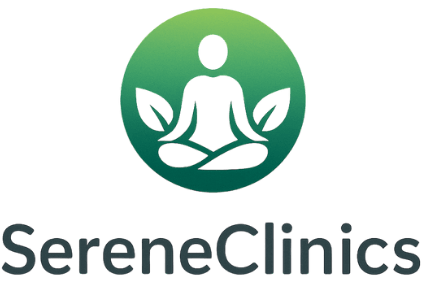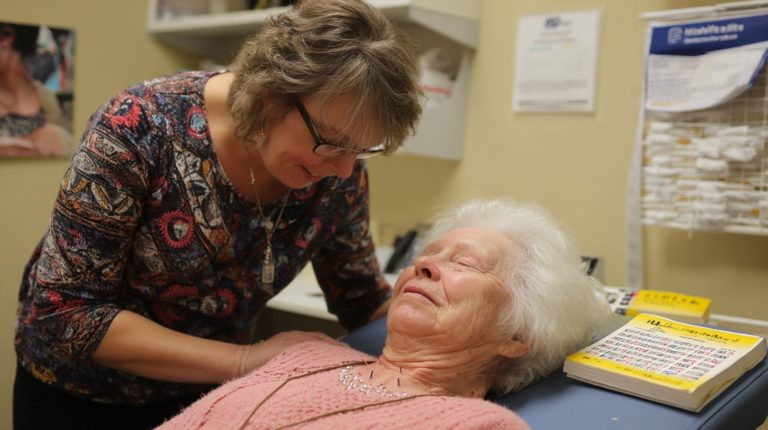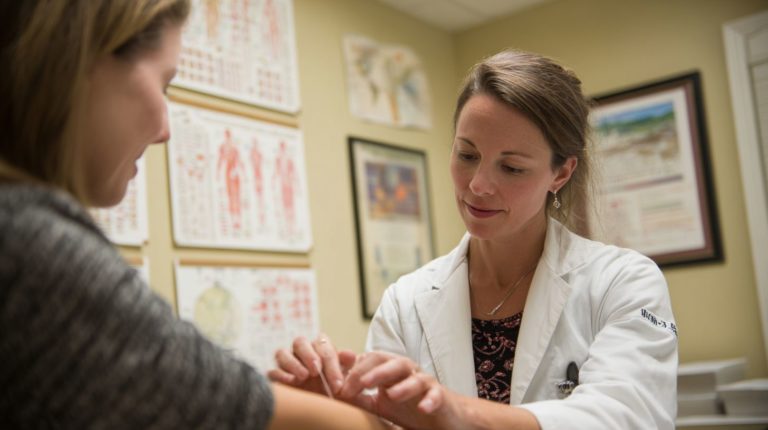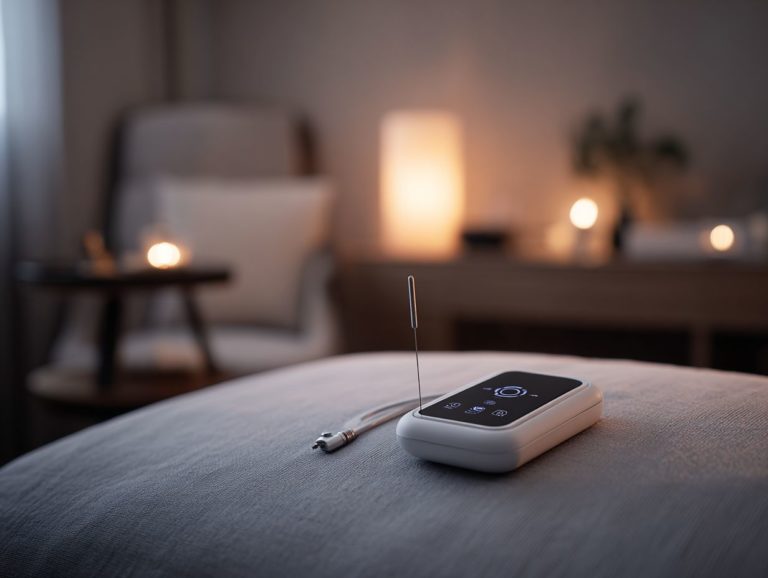Choosing an Acupuncture Practitioner: Steps and Credentials
Acupuncture is an old healing method that considers the whole person for health and well-being. Choosing a licensed acupuncturist can be challenging.
This guide provides essential steps to choose a practitioner who meets your unique needs and goals. Learn what credentials to look for and the critical questions to ask during a consultation.
Find out what you need to make a well-informed decision on your way to wellness.
Key Takeaways:
Contents
- 1 What is Acupuncture?
- 2 What is a Licensed Acupuncturist?
- 3 What are the Steps to Choosing an Acupuncture Practitioner?
- 4 Acupuncture Practitioner Data
- 5 What are the Credentials to Look for in an Acupuncture Practitioner?
- 6 What Questions Should You Ask During a Consultation?
- 7 What Should You Look for During a Consultation?
- 8 Frequently Asked Questions
- 8.1 What are the steps to choosing an acupuncture practitioner?
- 8.2 What credentials should I look for in an acupuncture practitioner?
- 8.3 Can I trust online reviews when choosing an acupuncture practitioner?
- 8.4 How important is it to choose an acupuncture practitioner who specializes in my specific condition?
- 8.5 What questions should I ask during a consultation with an acupuncture practitioner?
- 8.6 How can I make sure I feel at ease with the acupuncture practitioner I select?
What is Acupuncture?
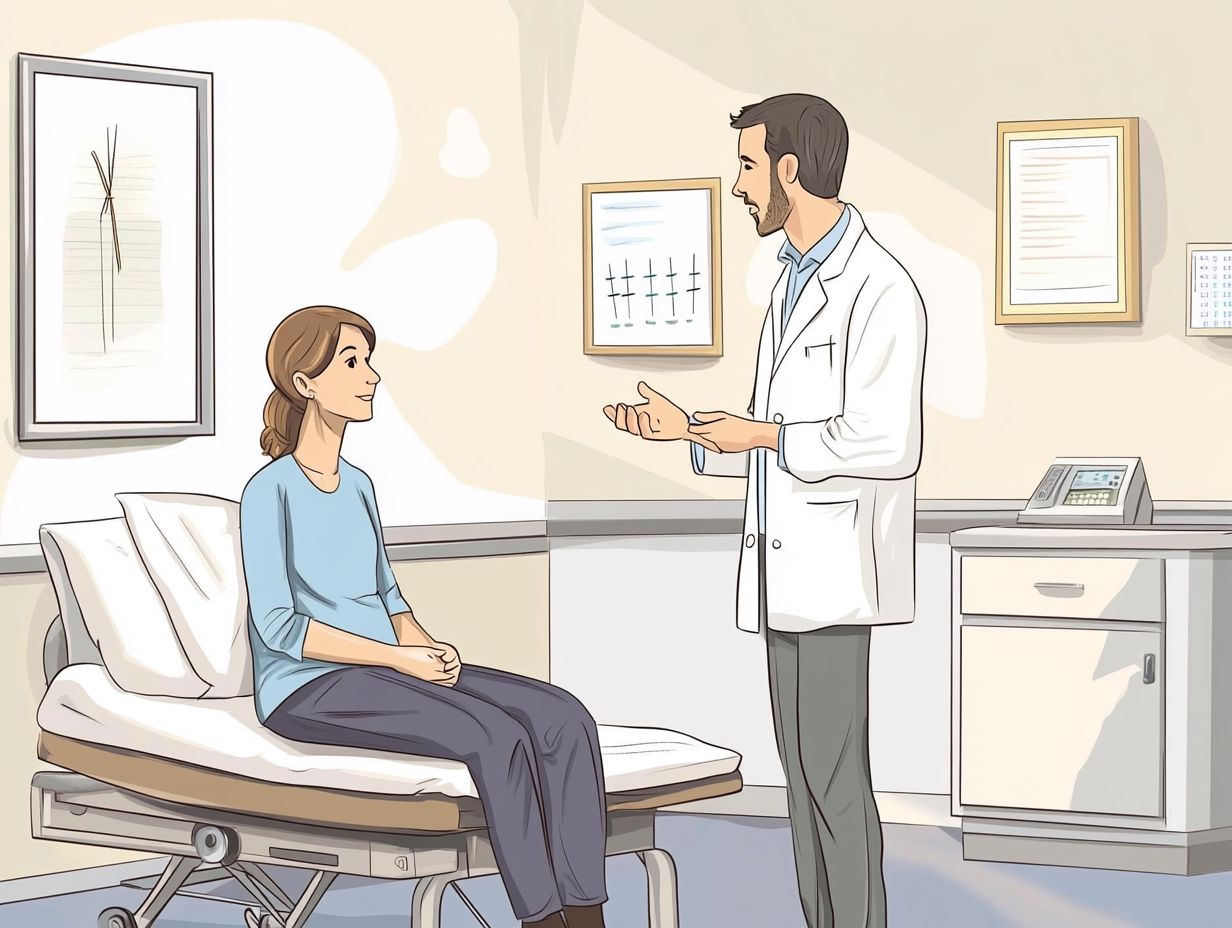
Acupuncture is an important part of Traditional Chinese Medicine (TCM) that uses thin needles inserted into certain points on the body, called acupuncture points or acupoints, to help restore balance and improve overall health.
This method helps control the body’s energy, reduce health problems, and relieve pain from chronic discomfort and other medical conditions. According to research featured in the American Academy of Family Physicians, acupuncture has been shown to be effective in managing chronic pain, highlighting its therapeutic benefits.
Experienced practitioners use different acupuncture techniques to create treatment plans that meet specific needs, keeping patient comfort and privacy a priority during the healing process. For a deeper exploration of how acupuncture can effectively alleviate pain, consider the insights provided in our [discussion on acupuncture’s pain relief techniques](https://sereneclinics.com/holistic-health/traditional-medicine-systems/traditional-chinese-medicine/acupuncture/acupuncture-for-pain-relief/acupuncture-pain-relief/).
What is a Licensed Acupuncturist?
A licensed acupuncturist is a professional who has completed substantial education and training in acupuncture and Traditional Chinese Medicine. They have the qualifications needed to offer successful treatments. These practitioners must meet certification requirements set by organizations such as the National Certification Commission for Acupuncture and Oriental Medicine, demonstrating their competence in acupuncture techniques and patient care.
Many begin this career by getting a master’s degree in acupuncture or a related field. This program includes classroom learning and practical clinical experience.
The coursework usually covers anatomy, physiology, and the basics of Traditional Chinese Medicine, which are important for gaining a complete knowledge of the body’s energy systems. For context, an in-depth analysis by WebMD explains the rigorous educational paths and certification processes required, underscoring the role of anatomy and physiology in understanding acupuncture.
Good communication skills are essential. Licensed acupuncturists need to explain treatment plans clearly and show empathy when discussing patient concerns. This helps create a caring space that promotes healing and trust.
Ongoing education and training help practitioners stay abreast of advancements in acupuncture techniques and patient care methodologies. To understand the safety measures and potential side effects involved, our instructional guide on acupuncture risks provides valuable insights.
What are the Steps to Choosing an Acupuncture Practitioner?
Choosing the right acupuncture practitioner is important for getting the health benefits you want and having a good treatment experience.
Start by figuring out why you want acupuncture, whether it’s for relieving pain or reducing stress. Then, look into local choices and see if there are any community acupuncture services nearby.
Pick a licensed acupuncturist who fits your health needs and preferences. Make sure to check their qualifications and read reviews from other patients to confirm you will get quality care. If interested, explore the benefits of electrical acupuncture to see how it might complement your treatment plan.
Acupuncture Practitioner Data
Acupuncture Practitioner Data
Acupuncture Usage and Trends: U.S. Usage Trends
The Acupuncture Practitioner Data offers useful information about the increasing interest and common use of acupuncture in the United States. The dataset focuses on usage trends from 2002 to 2022, highlighting significant growth and the current number of users.
The Acupuncture Usage and Trends reveals a 120% increase in acupuncture usage from 2002 to 2022. This large increase shows that more U.S. adults are accepting acupuncture as another option or addition to their health care. Factors contributing to this growth may include more people knowing about the benefits of acupuncture, such as pain relief, stress reduction, and better overall health, along with a trend towards combining traditional and modern healthcare methods.
- Currently, there are 7.3 million U.S. adult acupuncture users. This figure shows that many people are looking for different treatments for health and wellness. The increase in users may be because acupuncture is now more accepted in mainstream medicine, with more doctors including it in their treatment plans.
Overall, the data demonstrates a clear upward trend in acupuncture usage, indicating its growing importance in the healthcare sector. As acupuncture continues to gain traction, practitioners might experience increased demand for services, encouraging more professionals to enter the field and further expand access to acupuncture.
1. Determine Your Needs and Goals
Determining your needs and goals is the first step in selecting an appropriate acupuncture treatment plan that aligns with your specific health issues and pain management objectives. Think about whether you want help with long-term pain, handling stress, or improving your emotional health to guide your conversations with potential acupuncturists.
Knowing about these personal health issues helps you clearly explain your goals, and it also helps the practitioner adjust their methods to fit your specific needs.
Reflect on any particular symptoms that may be affecting your daily life or specific treatments you have previously tried. This self-assessment encourages a more meaningful dialogue, enabling you to find a practitioner who is well-versed in the acupuncture techniques that best suit your individual needs.
A serious talk about your goals will lead to better treatment and a stronger working relationship.
2. Research Local Acupuncture Practitioners
Researching local acupuncture practitioners is essential to finding a qualified and experienced acupuncturist who meets your specific needs and goals. Use online resources, directories, and community acupuncture clinics to create a list of possible practitioners. Make sure they have the required licenses and credentials.
This process helps find qualified individuals and lets people compare different practitioners’ specialties and techniques.
Getting advice from friends, family, or healthcare providers can help you find great options nearby. Many practitioners have online reviews and comments that can show information about how they work and how happy their patients are.
Consider trying local community acupuncture, which can offer affordable care and create a helpful atmosphere. Make sure to check the practitioner’s licenses and memberships to confirm they follow industry rules. This is important for your safety and satisfaction.
3. Check for Credentials and Certifications
Looking at credentials and certifications is key to confirming your acupuncturist has the right training and skills to give acupuncture treatment that works. Licensed acupuncturists should have certification from recognized bodies, such as the National Certification Commission for Acupuncture and Oriental Medicine, indicating they have met the necessary educational and competency requirements.
Checking these qualifications gives clients confidence in the practitioner’s skills and shows dedication to patient safety and ethical standards.
When people check the acupuncturist’s qualifications, they feel more at ease and assured, knowing the practitioner can handle different health problems.
An acupuncturist with verified credentials is more likely to keep up with the latest methods and developments in the field, improving the treatment experience.
This detailed evaluation process is important to make sure that patients get the best care suited to their individual needs.
4. Read Reviews and Ask for Referrals
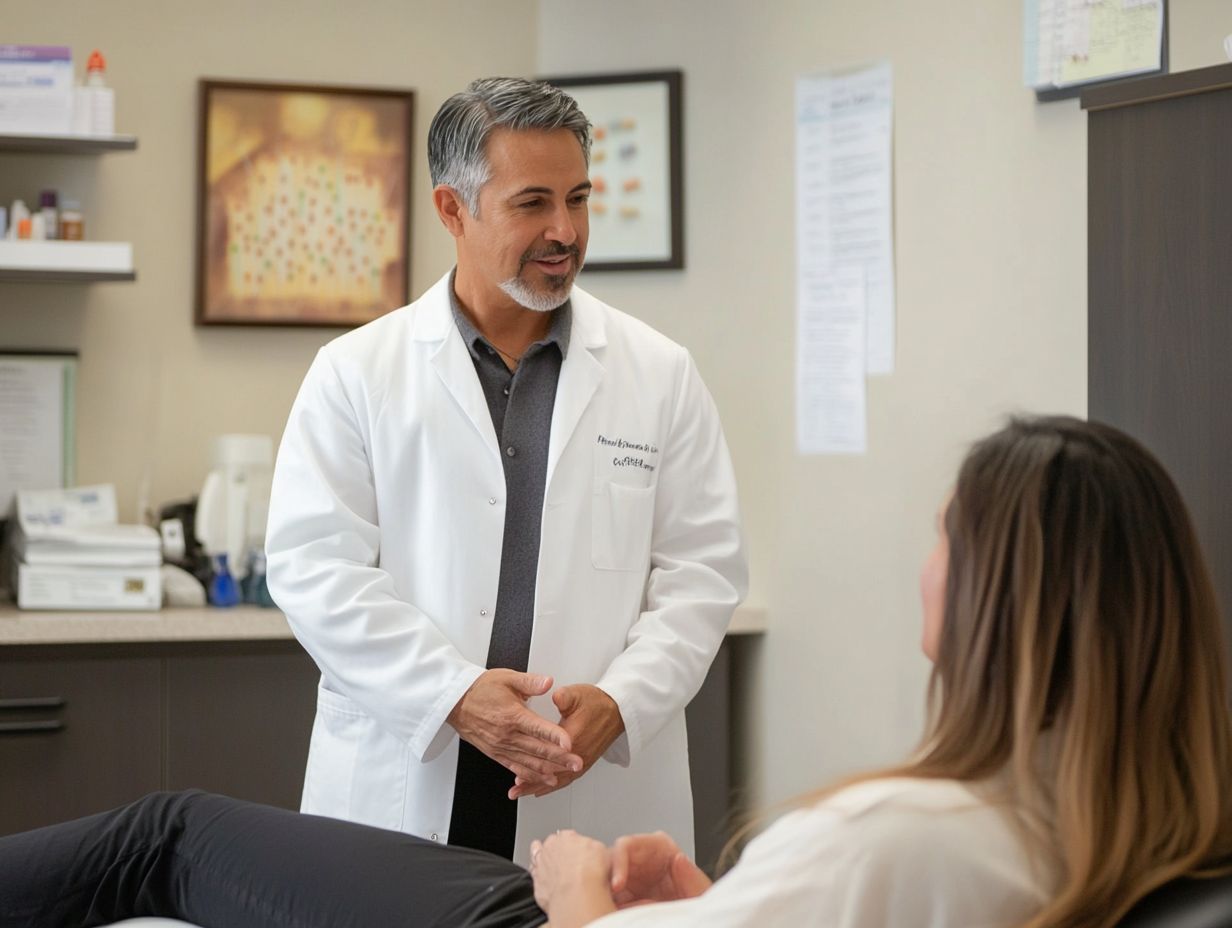
Looking at reviews and asking for recommendations can give you useful information about past patients’ experiences and help you judge the quality of care from a licensed acupuncturist. Positive testimonials can highlight an acupuncturist’s communication skills, treatment effectiveness, and overall patient satisfaction.
When thinking about acupuncture, it’s important to mix these sources of information for a complete view. Online reviews often reflect a range of experiences, while personal referrals from trusted friends or family can offer deeper levels of trust and reassurance.
Feedback helps to show the skills of the practitioner and provides a sense of the clinic’s environment and what patients go through. This balanced method helps individuals choose wisely, resulting in more trust in their choice of acupuncturist.
5. Schedule a Consultation
Scheduling a consultation with potential acupuncturists is an important step in selecting the right practitioner, allowing you to assess their communication skills and approach to patient care. During this initial meeting, discuss your health concerns, treatment goals, and any questions you may have regarding their acupuncture techniques and methods.
This consultation is an important conversation where both you and the acupuncturist can discuss and evaluate your needs. Expect a friendly and honest chat where they pay attention to what you need and explain their methods.
It’s important to measure their empathy by watching how attentive they are and if they show real interest in your health progress. A good acupuncturist should describe their techniques and collaborate with you to create a treatment plan that matches your health requirements, ensuring you feel understood and valued throughout the process.
What are the Credentials to Look for in an Acupuncture Practitioner?
When reviewing acupuncture practitioners, it’s important to check their credentials. These show their training, qualifications, and dedication to acupuncture and Traditional Chinese Medicine.
Key credentials include:
- Acupuncture training from recognized schools
- Meeting certification standards (see also: Electrical Acupuncture: Benefits and Certification)
- Belonging to professional groups that encourage best practices and continuous learning
1. Licensure and Certification
Licensure and certification indicate an acupuncturist is trained, ensuring they adhere to regulations to practice acupuncture lawfully and safely. Professionals should hold a valid license issued by their state and certification from reputable organizations, such as the National Certification Commission for Acupuncture and Oriental Medicine.
These credentials show that the practitioner has completed extensive training and education, giving them the skills to manage different health conditions well.
For patients, knowing that their acupuncturist is licensed and certified offers a significant sense of security, as it instills confidence in the practitioner’s abilities and adherence to ethical standards.
These qualifications often make sure that the acupuncturist stays informed about the newest techniques and safety rules, creating a safer and more effective treatment setting.
2. Education and Training
Education and training are important for acupuncturists, providing the knowledge and skills to treat patients thoroughly. This typically includes coursework in acupuncture techniques, Traditional Chinese Medicine principles, and clinical training under experienced practitioners.
People training to become acupuncturists learn about the body’s structure, how it works, and the principles of right and wrong to know how the body functions and keep patients safe.
Training programs emphasize the importance of effective communication and cultural competency, enabling them to connect with diverse patient populations. This complete education improves their technical skills and encourages a caring awareness of personal needs.
This thorough training creates a knowledgeable professional who can handle the challenges of patient care by merging established concepts with practical experience.
3. Experience and Specializations
Experience and specialization are key factors to consider when evaluating an acupuncturist’s qualifications, as they can significantly influence treatment effectiveness for specific health concerns. Practitioners with a wealth of experience and specialized training may be better equipped to handle particular issues such as chronic pain, stress management, or other related conditions.
This is why it’s highly beneficial for potential patients to ask about the practitioner’s background and any areas of focus they might have.
Knowing a practitioner’s background can reveal their method and help build trust and connection, which are important for effective treatment.
When professionals are knowledgeable in specific techniques or methods, they can improve patient results by applying strategies personalized to each person’s needs.
Talking about their qualifications can help make healing more successful.
4. Professional Memberships
Professional memberships in reputable acupuncture associations can further validate an acupuncturist’s qualifications and commitment to maintaining high standards in their practice. These memberships often require ongoing education and adherence to ethical guidelines, ensuring that practitioners stay updated on the latest advancements in acupuncture techniques and patient care.
These connections help build trust and create a community where professionals share knowledge and experiences.
Organizations like the National Certification Commission for Acupuncture and Oriental Medicine (NCCAOM) and the American Association of Acupuncture and Oriental Medicine (AAAOM) are important in setting standards through resources such as workshops, conferences, and research publications.
Joining these associations helps acupuncturists develop their abilities and raise the level of care they offer, which benefits both their patients and the profession.
What Questions Should You Ask During a Consultation?
It’s important to ask the right questions when meeting with an acupuncturist. This helps you learn about how they treat patients and make sure they can help with your health issues.
You might want to ask about their background, the types of acupuncture they use, and how they create treatment plans that fit your needs. Related insight: Acupuncture: Pain Relief Uses, Techniques, and Effectiveness
1. What Conditions Do You Typically Treat?

Knowing the common problems an acupuncturist deals with can show you their skills and help you decide if they are the right person for your health needs. Experienced acupuncturists often have particular focus areas, such as pain management, stress management, or other common ailments.
By talking with professionals about their past experiences and how often they’ve successfully treated the conditions you have, you can learn useful information that might match your health goals.
It’s beneficial to inquire about their treatment methods, as well as any outcomes they’ve achieved with patients that have similar issues. Talking openly creates trust and lets you confirm that the acupuncturist can give the specific care needed for your personal health needs.
2. What Techniques Do You Use?
Asking about the methods an acupuncturist uses can give you a clear idea of their treatment plan and what will happen in your sessions. Methods might involve using needles, burning herbs, or treatments that do not require needles, based on the practitioner’s skill.
Learning these methods helps clients feel more involved in their recovery process. Each style, whether it emphasizes quick needle insertion for immediate relief or a more gentle, slow approach for chronic conditions, can cater to individual needs.
Practitioners might use other methods like cupping or herbal remedies to improve general well-being. When looking into these choices, it’s helpful to ask how each one fits with your health needs and what benefits they provide.
This conversation builds trust and adjusts the experience to reach the best results.
3. How Many Sessions Will I Need?
Knowing the number of acupuncture sessions needed helps set realistic expectations for your treatment plan and improves patient comfort. Experienced practitioners can provide estimates based on your specific health issues and treatment goals following an initial assessment.
It’s important to remember that each person’s body reacts differently to acupuncture. The number of sessions needed to achieve the best results can depend on how serious and long-lasting the condition is, the patient’s overall health, and their daily habits.
Patients are encouraged to engage in an open dialogue with their acupuncturist about typical session frequency and desired outcomes. The practitioner’s experience can help create a plan specific to each person’s needs, making sure every session aids their path to well-being.
4. What Are the Risks and Side Effects?
Discussing the risks and potential side effects of acupuncture is an important part of ensuring informed patient care, as it helps set realistic expectations and builds trust in the practitioner-patient relationship. Licensed acupuncturists should be open about any risks associated with treatment and how they manage patient safety.
When patients are comfortable discussing their concerns, healthcare professionals can address any questions more effectively. People interested in acupuncture should openly discuss their treatment choices.
They should feel confident asking the practitioner about their history in handling challenges, as this can give helpful information about their skill and method of providing care. Talking openly makes the treatment process better and strengthens teamwork in healthcare, which leads to better results and happier patients.
What Should You Look for During a Consultation?
During an acupuncture visit, certain aspects can show the quality of care you might receive from the practitioner. Make sure the place is clean, the practitioner communicates clearly, and they focus on your comfort, as these aspects can greatly affect your treatment experience.
Also, notice if the practitioner can create a treatment plan that fits your particular health issues.
1. Clean and Sanitary Environment
A clean and sanitary environment is essential in an acupuncture practice, as it directly affects patient comfort and safety during treatment sessions. Ensuring that needles and equipment are properly sterilized can help prevent infections and promote a positive experience for patients.
A clean environment builds trust and confidence, helping people to feel at ease and focus on their recovery.
Practitioners can maintain cleanliness by regularly disinfecting surfaces, changing linens, and using throwaway materials whenever possible. They should also follow strict protocols for needle disposal and sterilization.
For patients, it’s important to assess the cleanliness of the environment upon arrival, observing if the treatment areas are tidy and if practitioners adhere to hygiene practices. Asking questions about the sterilization process can also provide an added layer of comfort and confidence in the safe delivery of care.
2. Good Communication and Listening Skills
Good communication and listening abilities are important qualities for any acupuncture practitioner because they help patients feel listened to and comprehended during their treatment process. An acupuncturist’s skill in working with patients helps build a cooperative relationship, which can improve how well the acupuncture treatment works.
By listening carefully to patients, practitioners can identify both physical symptoms and emotional situations that might affect recovery. Paying close attention helps better recognize what the patient needs and builds trust, encouraging people to discuss their worries freely.
Empathetic replies confirm emotions and help patients feel secure in their interactions with practitioners. As a result, people looking for care should check these qualities in their consultations, as they can strongly affect their experience and results in treatment.
3. Empathy and Compassion
Empathy and compassion are important qualities for an acupuncture practitioner because they help create a caring environment for patients during their treatment. When practitioners show they understand and care about their patients’ emotional and physical health, it can build trust and create a better acupuncture experience.
These qualities help patients feel more at ease and encourage honest conversations about their health issues. When individuals feel genuinely heard and valued, they are more likely to share their symptoms and experiences candidly, allowing practitioners to tailor their approaches more effectively.
Such a setting motivates patients to take an active role in their treatment process, resulting in better teamwork and improved results. When healthcare providers show empathy and kindness, they help reduce the stigma around health issues. This makes patients more comfortable asking for help and sharing their concerns without fear of judgment.
4. Personalized Treatment Plan
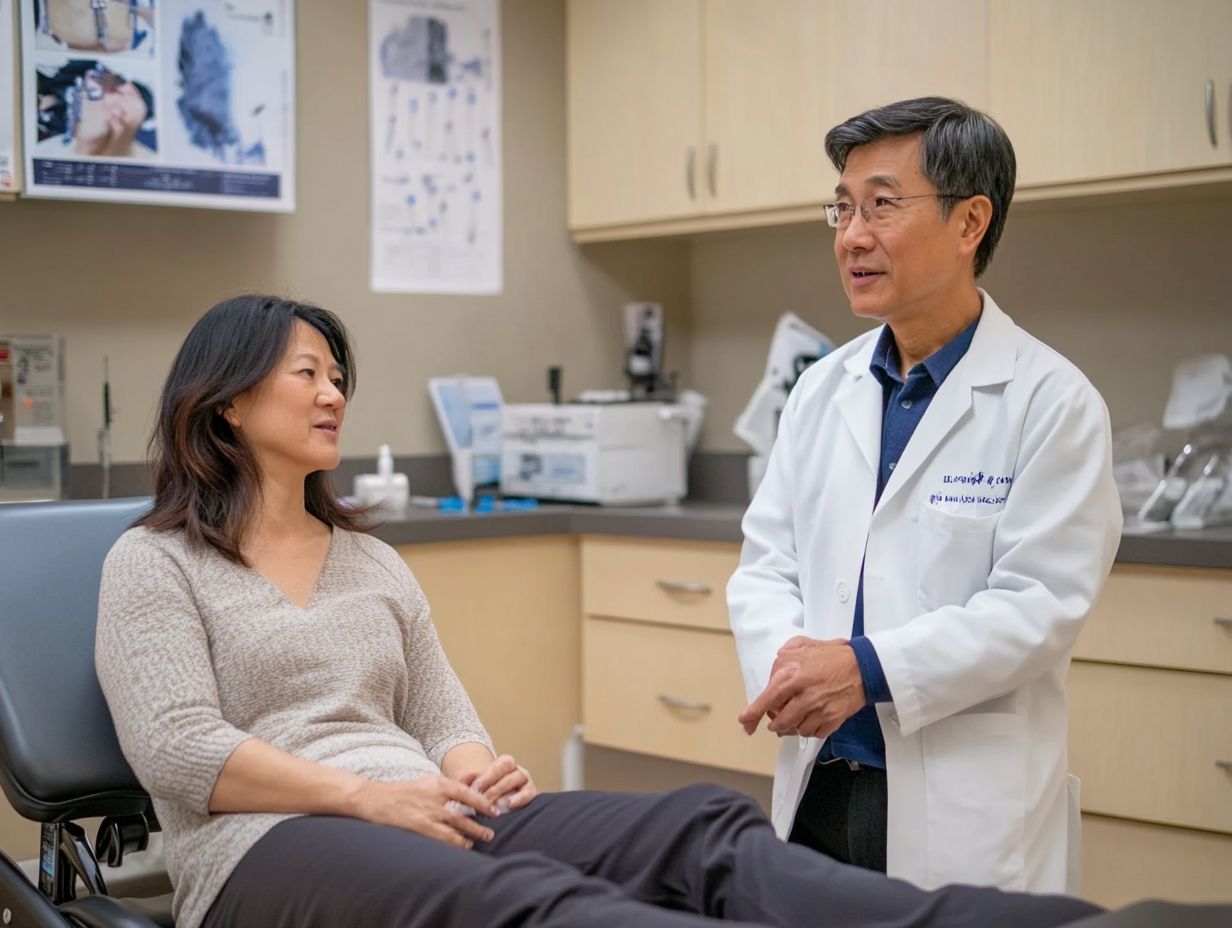
Tailoring a treatment plan is an essential part of good acupuncture care, as it allows practitioners to adjust their methods to meet the unique needs and objectives of each patient. During consultations, practitioners should discuss their approach to developing these plans and how they will monitor progress throughout the treatment process.
Customized treatment plans improve the success of the therapy and help learn more about each person’s reaction to the needles and methods applied.
By regularly checking patients’ symptoms and general health, acupuncturists can adjust their methods to improve results.
People thinking about acupuncture should feel comfortable asking practitioners how plans change over time based on their feedback and experiences.
This conversation is an integral part of building a supportive and collaborative therapeutic relationship.
Frequently Asked Questions
What are the steps to choosing an acupuncture practitioner?
The first step is to do some research and ask for recommendations from friends or family. Next, make sure to verify the practitioner’s credentials and experience. Set up a meeting to ask questions and make sure it suits your needs. Lastly, trust your instincts and choose a practitioner you feel comfortable with.
What credentials should I look for in an acupuncture practitioner?
Look for a practitioner who is licensed in your state and has completed an accredited acupuncture program. It is also beneficial to choose a practitioner with additional certifications or specialized training in areas such as pain management or fertility support.
Can I trust online reviews when choosing an acupuncture practitioner?
While online reviews can be helpful in providing feedback from past clients, it is important to take them with a grain of salt. Some reviews may be biased or not reflect the overall experience with the practitioner. It is best to combine online reviews with personal recommendations and your own research.
How important is it to choose an acupuncture practitioner who specializes in my specific condition?
While it is not necessary to find a practitioner who specializes in your specific condition, it can be beneficial. They might know more and have more practice in treating your condition, which can lead to better results. However, any licensed and trained healthcare provider can give good treatment for different health problems.
What questions should I ask during a consultation with an acupuncture practitioner?
You can ask about the practitioner’s education and experience, their treatment methods and techniques, and any additional certifications or specialties they may have. It is also important to ask about the cost of treatment and any insurance coverage options. Don’t be afraid to ask any other questions or express any concerns you may have.
How can I make sure I feel at ease with the acupuncture practitioner I select?
Trust your instincts and listen to your body’s response during the consultation. It is also important to find a practitioner who communicates well, listens to your needs, and explains the treatment process. You may also want to ask for a trial treatment or a brief demonstration to get a feel for their approach and style.

Sheetal Sharda has a background in CS. She got an interest in Holistic living back in 2018, and has since started exploring more into Naturapathy, Holistic Living, Yoga, and more. She got inspired to start SereneClinics to help people find reliable centers across the world.
